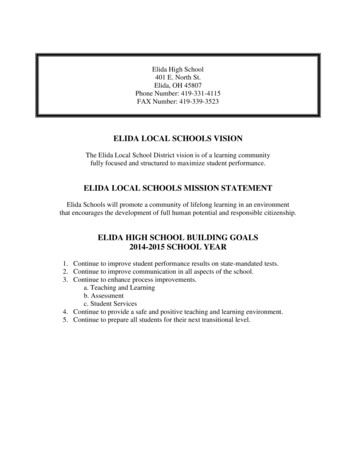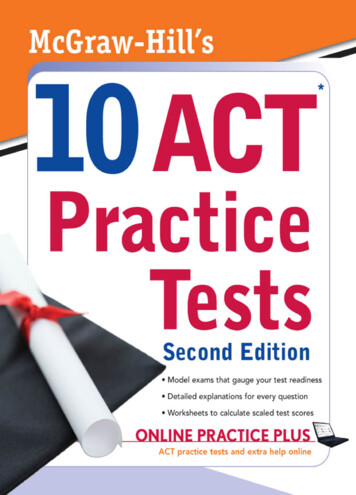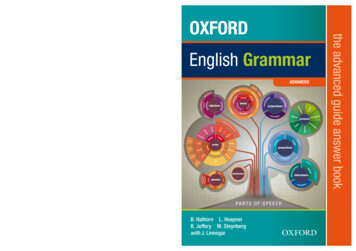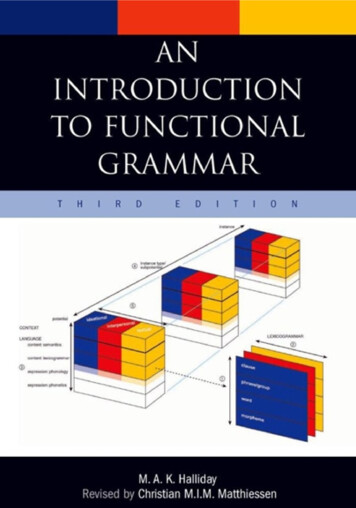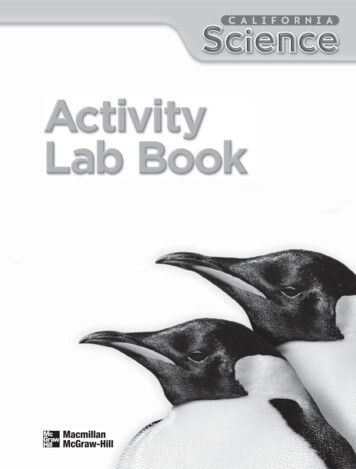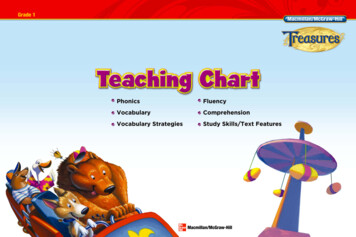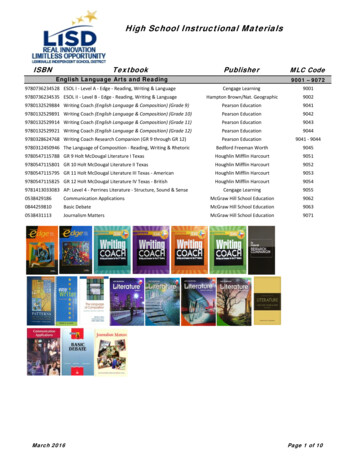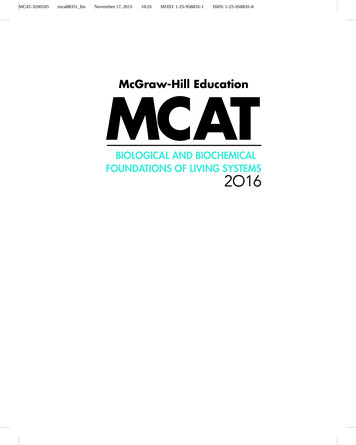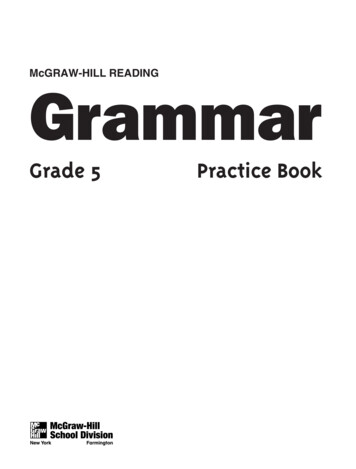
Transcription
McGRAW-HILL READINGGrammarGrade 5Practice Book
NameLEARNDateGrammar1Sentences A sentence is a group of words that expresses a completethought. A sentence fragment is a group of words that does notexpress a complete thought. Every sentence begins with a capital letter. A statement is a sentence that tells something. It ends with aperiod. A question is a sentence that asks something.It ends with a question mark.Read each group of words. Place a period on the line at the end if itis a sentence. If it is not a sentence, leave the line blank.1. The village was ruled by a mean lord2. A young farmer and his aged mother3. Could not leave his mother(blank)(blank)4. The farmer hid his mother under his house.Place a period on the line at the end of the sentence if it is a statement. Place aMcGraw-Hill School Divisionquestion mark at the end of the sentence if it is a question.5. Why did the farmer hide his mother6. Fierce warriors came to the village7. How would the village survive8. Lord Higa planned to take over the village8Grade 5/Unit 1The Wise Old WomanExtension: Ask students to write two statements andtwo questions about Uchida’s story. Have themdiscuss which part of the story their sentencescover.1
NameDateLEARN AND PRACTICEGrammar2Commands and Exclamations A command tells or asks someone to do something.It ends with a period. An exclamation shows strong feeling. It ends with anexclamation mark.Read each sentence. Place a period on the line at the end of the sentenceif it is a command. Place an exclamation mark at the end of the sentence ifit is an exclamation.!2. Follow his instructions.3. Make a rope out of ashes.4. What an impossible task that would be!!5. How quickly the villagers go to the shrine.6. Finish these tasks before Lord Higa comes7. What fools you people are!.8. Show me the drum that makes a sound by itself9. How cleverly you have done these tasks!10. Wow, what a great reward the young lord has given her2Extension: Invite students to write a brief story (seriousor humorous) about a task that seems impossible.Urge them to include two commands and twoexclamations, and remind them to use the correct endmark in each sentence.McGraw-Hill School Division1. How cruel Lord Higa is!Grade 5/Unit 1The Wise Old Woman10
NamePRACTICE AND REVIEWDateGrammar3Sentences A statement is a sentence that tells something.It ends with a period. A question is a sentence that asks something. It ends with aquestion mark. A command tells or asks someone to do something.It ends with a period. An exclamation shows strong feeling. It endswith an exclamation mark.Read each sentence. On the line at the end of each sentence place aperiod if it is a statement or command, an exclamation mark if it is anexclamation, or a question mark if it is a question.1. Take the old people to the mountains. ; command2. Why is that young lord so mean3. How cold it is in the forest! ; exclamation4. The farmer hid his mother in a caveMcGraw-Hill School Division5. What can we do6. Please pray for help. ; statement? ; question. ; command7. The farmer’s mother has completed the tasks. ; statement8. What a great thing she has done for our village! ; exclamation8Grade 5/Unit 1The Wise Old WomanExtension: Have partners create a dialogue betweenthe farmer and his mother using at least one ofeach type of sentence. Ask them to read it aloud tothe rest of the class.3
NameDateMECHANICSGrammar4Sentence Punctuation Every sentence begins with a capital letter. A statement ends with a period. A question ends with a question mark. A command ends with a period. An exclamation ends with an exclamation point.Rewrite these sentences correctly by adding a period to a statement orcommand, a question mark to a question, and an exclamation mark to anexclamation. Make sure each sentence starts with a capital letter.1. the young lord looked at the three completed tasks2. how did you solve these puzzlesHow did you solve these puzzles?3. what a mistake I have madeWhat a mistake I have made!McGraw-Hill School Division4. please take these bags of gold5. how could anyone destroy such clever people4Extension: Ask students to choose a televisionprogram that they enjoy. Have them write onestatement, one question, one command, and oneexclamation about the program.Grade 5/Unit 1The Wise Old Woman5
NameDateTESTGrammar5SentencesRead each sentence. Write whether it is meant to be a statement, aquestion, a command, or an exclamation. Then rewrite the sentence sothat its end marks and capitalization are correct.1.2.commandtake all the older people away3.statementthey cannot work any longer4.What a terror Lord Higa is5.Is there nothing for us to do6.McGraw-Hill School DivisionWhy must my mother stay in the mountainsquestionwhen will we ever have a kind lord7.bring me the answers now8.lord, I have brought you the answers9.How could a poor farmer solve the puzzle10.10how cleverly the woman has saved usGrade 5/Unit 1The Wise Old Woman5
NameDateMORE PRACTICEGrammar6Sentences A statement is a sentence that tells something.It ends with a period. A question is a sentence that asks something.It ends with a question mark. A command tells or asks someone to do something.It ends with a period. An exclamation shows strong feeling. It endswith an exclamation mark.Label each sentence as a statement, command, question, or exclamation.Then write each sentence correctly. Finally, illustrate one of the sentences.1. the farmer carried his mother up the mountainThe farmer carried his mother up the mountain.2. how fierce Lord Higa’s warriors look3. solve these tasks nowMcGraw-Hill School Division4. will that ant get the thread through this log6Grade 5/Unit 1The Wise Old Woman4
NameDateLEARNGrammar7SubjectThe subject of a sentence tells whom or what the sentence is about. The complete subject includes all the words in the subject. The simple subject is the main word in the complete subject.It tells exactly whom or what the sentence is about. You can sometimes correct a sentence fragment byadding a subject.Read each sentence. Circle the simple subject.1. Lucy swam toward the ship.2. A sailor threw her a rope.3. Caspian helped Lucy get on board.4. The king gave his friend some dry clothes.5. Lucy, very grateful, bowed to the young king.Read each sentence. Circle the simple subject and underline the completesubject.6. Lucy’s cousin Eustace cried for help.McGraw-Hill School Division7. The frightened boy did not want to stay on the ship.8. The bobbing craft made him seasick.9. The mouse, Reepicheep, disgusted him.10. Eustace’s wet clothes were cold and uncomfortable.10Grade 5/Unit 1The Voyage of the Dawn TreaderExtension: Have students write two sentences aboutthe story. Ask them to circle the simple subject andunderline the complete subject in each of theirsentences.7
NameDateLEARN AND PRACTICEGrammar8PredicateThe predicate of a sentence tells what the subject does or is. The complete predicate includes all the words in the predicate. The simple predicate is the main word in the completepredicate. It tells exactly what the subject does or is. You can sometimes correct a sentence fragment byadding a predicate.Read each sentence. Underline the complete predicate. Circle the simplepredicate.1. Caspian rescued his friends.2. The king gave them hot drinks.3. He led the children to his cabin.4. He let them borrow his clothes.5. The friends talked all afternoon.Read each sentence fragment. Turn the fragment into a sentence byadding a complete predicate.6. Caspian and his crew7. Lucy and EdmundMcGraw-Hill School Division8. Their cousin Eustace9. The mouse, Reepicheep,10. The big ship8Extension: Have students write a few sentences abouttraveling on a sailing ship. Ask them to circle thesimple predicate in each.Grade 5/Unit 1The Voyage of the Dawn Treader10
NameDatePRACTICE AND REVIEWGrammar9Writing Subjects and Predicates The complete subject includes all the words in the subject. The simple subject is the main word in the complete subject. Ittells exactly whom or what the sentence is about. The complete predicate includes all the words in the predicate. The simple predicate is the main word in the completepredicate. It tells exactly what the subject does or is.Read each fragment. Turn the fragment into a sentence by adding acomplete subject.1.looked at the painting of the ship.2.complained about everything.3.splashed the children.4.screamed for help.5.kicked off her shoes.Read each fragment. Turn the fragment into a sentence by adding acomplete predicate.6. Narnia, a magical land,7. The king named CaspianMcGraw-Hill School Division8. Reepicheep, the huge mouse,9. The captain’s crew10. That evening, the children10Grade 5/Unit 1The Voyage of the Dawn TreaderExtension: Have students work in pairs and writefour sentence fragments each. Then have themcomplete their partner’s fragments with subjects orpredicates.9
NameDateMECHANICSGrammar10Letter Punctuation Begin the greeting and the closing of a letter with a capital letter. Use a comma after the greeting in a friendly letter and the closingin all letters. Use a comma between the names of a city and a state. Use a comma between the day and year in a date.Correct the following letter. Write capital letters where needed. Add commaswhere they belong.October 9 1943dear aunt AlbertaYou won’t believe what happened to us! Edmund eustace, and Iwere looking at your painting. Suddenly, we were splashing in theocean. A brave young king rescued us. Now we are sailing somewherefar away. You can leave a message for me at this address.P.O. Box 345London englandMcGraw-Hill School Divisionyour nieceLucy10Grade 5/Unit 1The Voyage of the Dawn Treader10
NameDateTESTGrammar11Subject and PredicateCircle the letter for each correct answer.1. Which of the following groups of words is a complete sentence?a. Eustace and his cousins.b. Stared at the painting.c. Suddenly, the waves began to move.d. Was sprayed in the face with salty water.2. Which of the following groups of words is a complete sentence?a. Stood on the edge of the picture frame.b. Lucy grabbed Eustace.c. Lost his balance.d. Tumbled into the cold ocean.3. Which sentence contains a simple subject that is underlined?a. Lucy liked to look at the ship.b. She was hoping to visit Narnia.c. Eustace told her to take him home.d. Caspian tried to cheer him up.4. Underline the simple subject of this sentence.No matter how hard he tried, Eustace could not pull the painting off the wall.5. Underline the complete subject of this sentence.McGraw-Hill School DivisionLucy and Edmund raced toward the moving ship.6. Underline the simple predicate in this sentence.The king of Narnia paced the deck of his ship.6Grade 5/Unit 1The Voyage of the Dawn Treader11
NameDateMORE PRACTICEGrammar12Subjects and Predicates The complete subject includes all the words in the subject. The simple subject is the main word in the complete subject.It tells exactly whom or what the sentence is about. The complete predicate includes all the words in the predicate. The simple predicate is the main word in the completepredicate. It tells exactly what the subject does or is.Mechanics Begin the greeting and the closing of a letter with a capital letter. Use a comma after the greeting in a friendly letter and the closingin all letters. Use a comma between the names of a city and a state. Use a comma between the day and year in a date.Work with a partner. Take turns reading each sentence aloud. Tell yourpartner the complete subject and the simple subject.1. Lucy’s clothes were drenched.2. The boy who cried was her cousin.3. The sailors on the ship helped the children.4. The spray from the ocean was cold and salty.5. Everybody was glad to see Lucy and Edmund.McGraw-Hill School DivisionTake turns reading these sentences aloud. Then write each sentence.Decide with your partner where the commas belong.6. Lucy and Edmund visited their cousin on June 22 1942.7. They talked about their relatives in Boise Idaho.8. Lucy’s mother was born on February 25 1925.12Grade 5/Unit 1The Voyage of the Dawn Treader8
NameDateLEARNGrammar13Sentencing Combining A conjunction joins words or groups of words. And, but, and orare conjunctions. Two related sentences can be joined with a comma andand, but, or or. A sentence that contains two sentences joined by and, but, oror is called a compound sentence.Read each pair of sentences. Rewrite them using and, but, or or alongwith a comma to make a single sentence.1. Wilma Rudolph was a very small child. People did not think she would survive.Wilma Rudolph was a very small child, and people did not think shewould survive.2. Wilma ran or jumped wherever she could. She was often sick.Wilma ran or jumped wherever she could, but she was often sick.3. There was only one doctor in Clarksville who would treat black people. Hewas very busy.4. Wilma got polio when she was almost five. The doctor said she would neverMcGraw-Hill School Divisionbe able to walk.5. Wilma heard what the doctor said. She kept moving anyway.5Grade 5/Unit 1Wilma UnlimitedExtension: Have students work with a partner. Telleach partner to write two pairs of sentences thatcan be combined with and, but, or or. Then haveeach partner give his or her sentences to the otherto complete.13
NameDateLEARN AND PRACTICEGrammar14Predicates You can combine two sentences by joining two subjects or twopredicates with and or or. A compound subject contains two or more simple subjects thathave the same predicate. A compound predicate contains two or more simple predicatesthat have the same subject.Read each set of sentences. Rewrite each set as one sentence. Combinethe compound subject or compound predicate in each pair with and or or.1. The doctors helped her. Wilma’s mother helped her.2. The doctors told Wilma to do her exercises. She would never walk.The doctors told Wilma to do her exercises or never walk.3. Wilma took off her brace. She walked into the church.4. Her family was amazed to see her walk. Her friends were amazed to see herwalk.Her family and friends were amazed to see her walk.McGraw-Hill School Division5. Wilma smiled when she sat down. Wilma sang when she sat down.6. Wilma could have kept the brace on. She could learn to walk without it.Wilma could have kept the brace on or learned to walk without it.14Extension: Ask students to write a brief story aboutsomeone who overcomes a great challenge. Havethem use at least one compound subject and onecompound predicate.Grade 5/Unit 1Wilma Unlimited6
NameDatePRACTICE AND REVIEWGrammar15Sentence Combining A sentence that contains two sentences joined by and, but, or oris called a compound sentence. A compound subject contains two or more simple subjects thathave the same predicate. A compound predicate contains two or more simple predicatesthat have the same subject.Read each pair of sentences. Rewrite them using and, but, or or along witha comma to make a single sentence.1. A college coach liked Wilma’s basketball playing. He liked her running more.A college coach liked Wilma’s basketball playing, but he liked her running more.2. The coach wanted her to be on his track team. He helped her win ascholarship.3. Wilma ran track in college. She became a member of the 1960 Olympic team.Wilma ran track in college, and she became a member of the 1960 Olympic team.4. The 1960 Olympics were held in Rome, Italy. They were the first Olympicsshown on television.McGraw-Hill School DivisionThe 1960 Olympics were held in Rome, Italy, and they were the firstOlympics shown on television.5. Wilma was a very fine runner. There were faster runners from other countries.Wilma was a very fine runner, but there were faster runners from othercountries.5Grade 5/Unit 1Wilma UnlimitedExtension: Have students make up pairs ofsentences that can be combined using a commaand a conjunction or by joining a compound subjector predicate. Then ask them to give their sentencesto another student to complete. Tell them to includecompound subjects and predicates.15
NameDateMECHANICSGrammar16Using Commas to Form Compound Sentences Use a comma before and, but, or or when you join two sentencesto form a compound sentence.Begin every sentence with a capital letter.When you form a compound sentence, do not begin the second part with acapital letter.Read each group of words. Then write them correctly on the line. Be sureto use capital letters and commas in the correct places.1. wilma was a very tiny baby and no one expected her to live.2. doctors were too expensive and her mother took care of her.3. wilma had polio and she lost the use of one leg.Read each pair of sentences. Then use a comma and and to combine them intoone sentence. Write the new sentence on the line. Use correct capitalization.4. Wilma loved to watch basketball. She dreamed of playing someday.McGraw-Hill School Division5. The people in the church were thrilled to see her walk. They couldn’t believe it.6. Wilma took off the brace forever. Her mother sent it back to the hospital.16Extension: Have students write six examples ofcompound sentences joined by and or but with acomma before it.Grade 5/Unit 1Wilma Unlimited6
NameDateTESTGrammar17Sentence CombiningRead the paragraph. Underline each compound sentence. Doubleunderline any compound subjects or compound predicates.Wilma Rudolph is one of the most famous Olympic runners. She ran in1960 and won three gold medals. Wilma’s team won the 400-meter relay,and they came from behind to win. Wilma ran last, and when she began shewas in third place. Most people thought she would never catch up. Shesurprised the crowd and pulled ahead at the last second. She had alreadywon the 100-meter and 200-meter races. And she was thrilled to win threegold medals. Wilma began her life unable to walk, but she became one of thefastest runners in the world. She was an inspiration to everyone.McGraw-Hill School DivisionWrite a paragraph about someone you know who has had to overcome avery difficult challenge. Use five compound sentences joined by and, but,or or. Be sure to use correct capitalization and punctuation.15Grade 5/Unit 1Wilma Unlimited17
NameDateMORE PRACTICEGrammar18Sentence Combining A sentence that contains two sentences joined by and, but, or oris called a compound sentence. A compound subject contains two or more simple subjects thathave the same predicate. A compound predicate contains two or more simple predicatesthat have the same subject.Mechanics Use a comma before and when you join two sentences to form acompound sentence. Begin every sentence with a capital letter.track meets are a lot of fun and there are many different events. if you like torun, there are different races. Many kids like to run and do other events. Youcan do the shot put or you might like to try the long jump. The pole vault andthe high jump are ways to get into the air.18Grade 5/Unit 1Wilma Unlimited5McGraw-Hill School DivisionLook at the picture. Then read the paragraph. Draw two lines under eachletter that should be a capital letter. Put in any missing commas. Underlineall compound sentences. Circle any compound subjects or predicates.
NameDateLEARNGrammar19More Sentence Combining A conjunction joins words or groups of words. You can use conjunctions other than and, but, or or to combinesentences. Some conjunctions tell where, when, why, how, or under whatcondition.Combine each pair of sentences using the conjunction in parentheses.1. Years had passed. The Zephyr had been wrecked. (since)2. The boy had no fear. He was a great sailor. (because)3. The boy refused to go home. He learned to fly. (unless)4. The Zephyr flew. The breezes were carrying it. (as if)McGraw-Hill School Division5. The Zephyr remained. It had fallen to the ground. (where)5Grade 5/Unit 1The Wreck of the ZephyrExtension: Have students write two simplesentences about the sea. Ask them to choose aconjunction from the list to combine the simplesentences.19
NameDateLEARN AND PRACTICEGrammar20Complex Sentences A sentence that contains two related ideas joined by aconjunction other than and, but, or or is called a complexsentence.Choose the correct conjunction in parentheses that combines each pair ofsentences into a new sentence that makes sense. Write the new sentence.1. Sailors must be careful. They value their ships. (because/until)2. The waves rose. They were hills. (as though/where)3. The boy flew with the new sails. The sailor slept. (while/if)4. The Zephyr would fly again. He could find the island. (if/as if)McGraw-Hill School Division5. Had the sailor dreamed it all? The boom hit his head.(whenever/when)20Extension: Arrange students in pairs. Ask each studentto write four simple sentences about the author’sstory. Then have partners use the specialconjunctions to combine each other’s sentences intotwo complex sentences.Grade 5/Unit 1The Wreck of the Zephyr5
NameDatePRACTICE AND REVIEWGrammar21Writing Complex Sentences A sentence that contains two related ideas joined by aconjunction other than and, but, or or is called a complexsentence.Combine each pair of complex sentences using the conjunction inparentheses.1. Sailors must know the sea. Their lives depend on that knowledge. (since)2. A stormy sea can toss boats. They were just toys. (as though)3. The boy could not believe his eyes. He saw two boats flying. (when)4. He would not be happy. He learned their secret. (unless)5. Flying a boat was hard. The boy never had flown before. (because)McGraw-Hill School Division6. The boy planned to fly the Zephyr. He wanted to go. (wherever)7. The boy was happy. He flew over land. (when)8. The ship fell. The boy tried to keep it flying. (although)8Grade 5/Unit 1The Wreck of the ZephyrExtension: Ask students to look though a newspaperor magazine to find examples of the conjunctionswhere, before, until, because, as if, and unless.Have students share and discuss the examples.21
NameDateMECHANICSGrammar22Quotations Use quotation marks at the beginning and end of a person’sexact words.Begin a quotation with a capital letter.“The Zephyr is there on the hill,” said the man.Rewrite each sentence. Place quotation marks where they are needed.Capitalize the first letter of each quote.1. The boy said, will you teach me?2. You must promise to leave, said the sailor.3. The wind is high tonight! said the boy.4. The boy asked, where have I landed?5. Fishermen warned, never sail in a storm.6. The boy replied, I am not worried.Write a dialogue between the old man and the boy. Write one part of thedialogue on each line. Be sure to place quotation marks around directquotes, and capitalize the first letter of each quotation.7.8.10.11.12.13.14.22Grade 5/Unit 1The Wreck of the Zephyr14McGraw-Hill School Division9.
NameDateTESTGrammar23More Sentence CombiningMcGraw-Hill School DivisionA. Circle the letter of the sentence which is combined in the best manner.1. Boats sail only on water. They are magic.a. Boats sail only on water unless they are magic.b. Boats sail only on water unless. They are magic.c. Boats sail only on water because they are magic.2. The Zephyr lay on the hill. It had been for years.a. The Zephyr lay on the hill. Because it had been for years.b. The Zephyr lay on the hill where it had been for years.c. The Zephyr lay on the hill. Where it had been for years.3. The boy wanted to fly the Zephyr. He had seen a ship fly.a. The boy wanted to fly the Zephyr because had seen a ship fly.b. The boy wanted to fly the Zephyr because. he had seen a ship fly.c. The boy wanted to fly the Zephyr if he had seen a ship fly.4. He knew he could fly. He practiced long enough.a. He knew he could fly when. He practiced long enough.b. He knew he could fly he practiced long enough.c. He knew he could fly if he practiced long enough.B. Circle the letter of the conjunction that best connects each sentence pair.5. The boy dressed and went out the sailor and his wife were sleeping.a. as ifb. whilec. until6. He flew through the night sky he was a bird.a. becauseb. as ifc. before7. The boy told his story it seemed impossible.a. althoughb. unlessc. wherever8. The man left the hill he told his story.a. ifb. unlessc. after8Grade 5/Unit 1The Wreck of the Zephyr23
NameDateMORE PRACTICEGrammar24Conjunctions and Complex Sentences You can use conjunctions other than and, but, or or to combinesentences.Some conjunctions tell where, when, why, how, or under whatcondition.A sentence that contains two related ideas joined by aconjunction other than and, but, or or is called a complexsentence.Work with a partner. List the conjunctions that you have learned this week.Then choose a conjunction and match it with one of the followingsentences. Each of you should use that conjunction to combine thesentence with a sentence of your own. (If the conjunction doesn’t seem tomake sense, match it with another sentence.) Write the new sentence thatyou both like better.1. I visited a fishing village.2. An old man told me a story.3. A boy saw two boats flying.4. Soon the Zephyr also flew.McGraw-Hill School Division5. The boat fell over land.6. What would you think?24Grade 5/Unit 1The Wreck of the Zephyr6
NameDateLEARNGrammar25Run-On Sentences McGraw-Hill School Division A run-on sentence joins together two or more sentences thatshould be written separately.You can correct a run-on sentence by separating two completeideas into two sentences.Correct the run-on sentences by writing two complete sentences. Rememberto add capital letters and end punctuation where they are needed.1. People want to predict the weather they have invented tools to do this.2. Tornadoes can have winds of 330 miles per hour they can also make a lot ofnoise.3. Tornado watchers drive very close to the tornado they leave an instrument tomeasure the storm.4. A tornado can pick up a car and a tree a tornado can pick up boulders.5. Scientists can watch a storm with a weather satellite these inventions havehelped save lives.6. Tornadoes mostly happen where the land is flat they happen most often in thesummer or the spring.7. Do you live where there are tornadoes we do not usually have tornadoes inCalifornia.8. People who live in tornado territory listen to the radio they listen for a tornadowatch and a tornado warning.8Grade 5/Unit 1Tornadoes!Extension: Ask students to proofread a partner'srecent writing assignment, looking for andcorrecting run-on sentences.25
NameDateLEARN AND PRACTICEGrammar26More Run-On Sentences You can correct a run-on sentence by rewriting it as a compoundor complex sentence.Correct each run-on sentence by rewriting it as a compound or complexsentence.1. Every place has one kind of severe weather someplaces have more than one.2. A tornado is one of the most dangerous storms no one can predict it.3. People lost their homes winds picked them up like toys.4. A tornado is formed cold air mixes with warm air.5. I would like to be a tornado chaser it seems like an exciting job.6. You might hear a tornado watch you go to the Midwest in summer.7. A hurricane brings violent winds it also brings heavy rain.8. Tornadoes are dangerous hurricanes are dangerous.26Extension: Have students write about theirexperiences with severe weather. Ask partners towrite paragraphs that are one long run-on sentence.Have students exchange papers and correct them bywriting shorter, complex, or compound sentences.Grade 5/Unit 1Tornadoes!8McGraw-Hill School Division
NameDatePRACTICE AND REVIEWGrammar27Correcting Run-On Sentences A run-on sentence joins together two or more sentences thatshould be written separately.You can correct a run-on sentence by separating two completeideas into two sentences.You can correct a run-on sentence by rewriting it as a compoundor complex sentence.Correct the run-on sentences. In some cases you may write two or moreshorter sentences. In some cases you can rewrite the sentence as acompound or complex sentence.1. We visited my Aunt Carole in Nebraska last summer and one Saturday therewas a tornado watch and we were nervous they called it off.We visited my Aunt Carole in Nebraska last summer. One Saturday2. Tornadoes have moved trains tornadoes have moved houses they havemoved big rocks they have moved trees.3. In The Wizard of Oz, Dorothy's house is picked up by a tornado it is takento the land of Oz.In The Wizard of Oz, Dorothy's house is picked up by a tornado. It istaken to the land of Oz.McGraw-Hill School Division4. The television news predicted a hurricane, Uncle George predicted ahurricane, and the weather radio in my dad's truck predicted a hurricane.The television news, Uncle George, and the weather radio in my dad's5. The weather seems calm today there might be a tornado they sometimesform on a day like today the weather is warm.The weather seems calm today but there might be a tornado. They5Grade 5/Unit 1Tornadoes!27
NameDateMECHANICSGrammar28Sentence Punctuation Every sentence begins with a capital letter. Use the correct end mark for each sentence.Read the paragraph. Rewrite the long run-on sentence correctly. Begineach sentence with a capital letter and be sure the end mark is correct.In the 1950s a hurricane hit the coast of Montauk, Long Islandmy grandparents were living there then they had a nice little houseright above the beach there had been a warning my grandparentsmoved inland but even in the center of the island the sky grew asblack as night and the winds howled fiercely Grandpa said it was thescariest thing he had ever seen the winds were so strong theycreated big waves that beat along the shore the sea gave somepeople gifts and took other people's valuable things away mygrandfather was an artist and he worked in a barn near the waterand when the hurricane came, the waves and wind picked up thatbarn and took it away they found the barn ten miles up island in EastHampton they never found th
McGraw-Hill School Division Sentences Grade 5/Unit 1 4 6 The Wise Old Woman 6 Grammar Name Date MORE PRACTICE A statement is a sentence that tells something. It ends with a period. A question is a sentence that asks something. It ends with a question mark. A command tells or asks someone to do something. It ends with a period.
